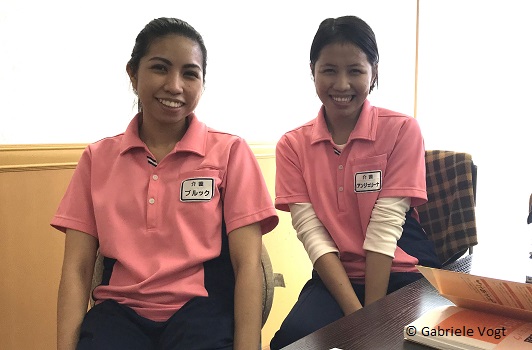Spring term 2024 lunch lectures at LMU Japan-Center
Das Japan-Zentrum lädt Sie im Rahmen der Vortragsreihe „Japan in International Relations“ im Sommersemester 2024 zu folgendem Vortrag herzlich ein:
Mittwoch 12.06.2024, 12.30 Uhr – 14.00 Uhr (CEST)
Prof. Dr. Gabriele Vogt, LMU München
For several decades now, the health care sector in Japan has been experiencing a severe labor shortage. The gap between a growing demand for health care services and a shrinking pool of domestic workers continues to widen. The introduction of a migration avenue for international health workers to Japan in the mid-2000s is generally understood to be the result of the ever-mounting strains, which the rapid population aging put on the labor market. As this was the first explicit opening of the domestic labor market to a workforce that so far has not been categorized as “skilled workers”, it is fair to conclude that this reform constitutes a paradigm shift in Japan’s migration policy.
In this presentation, I will sketch out Japan’s demographic development, and its implications on the health care sector in more depth. I will focus on health workers in elderly care, as they are a group that is particularly high in demand on the Japanese labor market. Subsequently, I will introduce the original migration avenue for health workers, which opened in 2008, and, despite the several revisions it has seen ever since, fails to draw a sufficient number of international health workers to Japan. Consequently, over the past years, migration flows of health workers to Japan have diversified. These more recent migration avenues include initiatives by business actors, such as utilizing the system of intracompany transfer and also educational institutions recruiting international students. In addition, policy reforms, such as opening the international trainee system to health workers, and the introduction of a specified skilled workers program contributed to the diversification of migration avenues to Japan. I will conclude with a contextualization and evaluation of the various migration avenues that are currently available to international health workers aiming for Japan as their destination.
Gabriele Vogt holds the Chair in Japanese Studies and serves as Director to the Department of Asian Studies at Ludwig-Maximilians-Universität (LMU) Munich. Her research covers the areas of political economy in the context of demographic transition and international labor migration, as well as local politics and social movements. She has published widely on Japan’s demographic change ever since serving as a co-editor (with Florian Coulmas, Harald Conrad and Annette Schad-Seifert) to the volume The Demographic Challenge: A Handbook about Japan (Brill, 2008). She is the author of Population Aging and International Health-Caregiver Migration to Japan (Springer, 2018). Some recent journal publications include: “The Aging Democracy: Demographic Effects, Political Legitimacy, and the Quest for Generational Pluralism.” In: Perspectives on Politics (2023, with Yosuke Buchmeier), https://doi.org/10.1017/S1537592723000981 (open access); “Sanitizing the national body: COVID-19 and the revival of Japan’s ‘Closed Country’ strategy.” In: Asian and Pacific Migration Journal (2022, with Sian Qin), https://doi.org/10.1177/01171968221125482 (open access); “Robotic devices and ICT in long-term care in Japan: Their potential and limitations from a workplace perspective.” In: Contemporary Japan (2021, with Anne-Sophie L. König), https://doi.org/10.1080/18692729.2021.2015846 (open access).
This presentation is based on: Vogt, Gabriele and Sian Qin (forthcoming): International health workers. In: Takahashi, Shin and Yasuko Hassall Kobayashi (eds.): The Handbook of Global Migration and Japan. London: Sage.
The event will take place onsite!
Location: LMU Japan-Center, Oettingenstraße 67, Room L155
